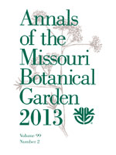
ANNALS OF THE MISSOURI BOTANICAL GARDEN
Scope & Guideline
Connecting Scholars to the Wonders of Plant Science
Introduction
Aims and Scopes
- Taxonomic Research:
The journal extensively publishes taxonomic revisions and descriptions of plant species, highlighting the importance of accurate classification and nomenclature in botany. - Phylogenetics and Evolutionary Biology:
Research often employs molecular phylogenetic techniques to elucidate evolutionary relationships among plant taxa, contributing to a deeper understanding of plant evolution. - Conservation and Endemism Studies:
The journal includes studies focusing on the conservation status of endemic and threatened plant species, emphasizing the need for biodiversity preservation. - Morphological and Micromorphological Analyses:
Papers frequently present detailed morphological studies, including micromorphological characteristics, aiding in the identification and classification of plant species. - Geographic and Ecological Distribution:
Research often investigates the geographic distribution of plant taxa, including studies on endemism and biogeography, which are crucial for conservation efforts.
Trending and Emerging
- Integrative Taxonomy:
There is an increasing trend towards integrative approaches that combine genetic, morphological, and ecological data to provide a comprehensive understanding of plant diversity. - Molecular Phylogenetics:
Recent publications have shown a significant rise in the use of molecular techniques to resolve taxonomic ambiguities and explore phylogenetic relationships, reflecting advancements in genetic research. - Conservation Assessment:
Emerging themes around the assessment of extinction risks and conservation strategies for endemic species highlight a growing concern for biodiversity loss and the urgency of conservation efforts. - New Species Descriptions:
The documentation of new species, particularly from diverse regions like South America, is on the rise, showcasing the continued discovery of plant diversity and the importance of field studies. - Ecological and Environmental Impact Studies:
There is a growing interest in studies that assess the ecological roles of plant species and their responses to environmental changes, underscoring the relevance of botany in addressing ecological issues.
Declining or Waning
- Historical Biographies and Contributions:
There has been a noticeable reduction in papers focusing on historical figures in botany and their contributions, indicating a potential shift towards more empirical and contemporary research. - Floral Morphology Studies:
The frequency of studies concentrating solely on floral morphology, while still present, seems to be diminishing in favor of more integrative approaches that combine molecular and morphological data. - Cytogenetics and Chromosome Studies:
Research on cytogenetics and specific chromosome studies appears to be less frequent, suggesting a waning interest or a shift towards broader genomic and molecular studies.
Similar Journals
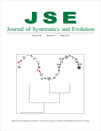
Journal of Systematics and Evolution
Unveiling Insights in Systematics and Plant ScienceThe Journal of Systematics and Evolution, published by WILEY, is a premier academic journal dedicated to advancing the fields of Ecology, Evolution, Behavior, and Systematics and Plant Science. With a distinguished Q1 ranking in both of these critical categories in 2023, it stands at the forefront of scientific research, placing it in the top quartile among its peers. Featuring both an ISSN of 1674-4918 and an E-ISSN of 1759-6831, the journal has been converging innovative research since its inception in 2008. The journal caters to a global audience of researchers, professionals, and students, providing a platform for disseminating significant findings and fostering academic dialogue. Its impressive Scopus rankings further affirm its impact, coming in at Rank #62/721 in Ecology and Rank #48/516 in Plant Science, highlighting its relevance and influence in these vibrant fields. As an open-access journal, it ensures that groundbreaking research is accessible to all, thus enhancing collaborative opportunities within the scientific community.
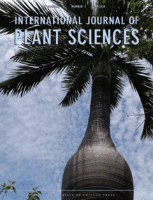
INTERNATIONAL JOURNAL OF PLANT SCIENCES
Cultivating excellence in plant research and publication.The INTERNATIONAL JOURNAL OF PLANT SCIENCES, published by UNIV CHICAGO PRESS, is a leading journal dedicated to advancing knowledge in the fields of plant sciences and ecology. With an ISSN of 1058-5893 and an E-ISSN of 1537-5315, this journal has been a prominent platform for groundbreaking research since its establishment, featuring works from 1983 to present. It holds an impressive Q2 ranking in both Ecology, Evolution, Behavior and Systematics and Plant Science, reflecting its reputable standing within the academic community. The journal is well-regarded for its rigorous peer-review process and commitment to high-quality publication standards, making it a favored choice for researchers, students, and professionals eager to engage with the latest findings and innovative methodologies in plant research. While it does not currently operate under an Open Access model, the journal provides ample access options for institutions and individuals keen to explore its curated content. By presenting diverse studies that blend theoretical and practical insights, the INTERNATIONAL JOURNAL OF PLANT SCIENCES plays a critical role in fostering interdisciplinary dialogue and advancing the frontiers of plant science research.
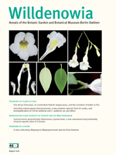
Willdenowia
Cultivating a deeper understanding of the plant kingdom.Willdenowia is a prestigious scientific journal published by the Botanischer Garten & Botanische Museum Berlin-Dahlem, dedicated to advancing the field of botany and plant sciences. With an ISSN of 0511-9618, this journal has established itself as a crucial platform for researchers, practitioners, and students interested in ecology, evolution, behavior, systematics, and plant science. The journal boasts an impactful reputation, evidenced by its impressive Q1 and Q2 quartile rankings in Plant Science and Ecology, Evolution, Behavior and Systematics respectively, as well as notable Scopus rankings, placing it within the top quartiles of its categories. Although access is not open, articles published in Willdenowia contribute significantly to the global body of botanical research, making it an essential resource for anyone looking to deepen their understanding of plant biology and related ecological disciplines. The journal has continuously evolved since its inception and aims to facilitate interdisciplinary collaboration and knowledge dissemination in the life sciences.
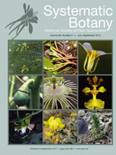
SYSTEMATIC BOTANY
Elevating Knowledge in Plant BiodiversitySystematic Botany, published by the American Society of Plant Taxonomists, is an esteemed journal focusing on the diverse fields of plant taxonomy, systematics, and evolution. With an ISSN of 0363-6445 and an E-ISSN of 1548-2324, this journal serves as a critical platform for researchers aiming to advance our understanding of plant biodiversity and evolutionary relationships. Operating since 1994, Systematic Botany has garnered significant recognition, achieving a Q2 ranking in Ecology, Evolution, Behavior and Systematics, and Plant Science categories, and ranking within the top half of Scopus for Genetics. The journal prioritizes publishing high-quality, peer-reviewed research, making it an essential resource for academics, practitioners, and students alike. Although it does not provide open access options, the journal's robust reputation in both American and international botanical research speaks to its pivotal role in disseminating vital scientific knowledge in the field. For those interested in the latest advancements in plant science, Systematic Botany is indispensable.
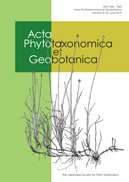
Acta Phytotaxonomica et Geobotanica
Exploring the Interconnections of Flora and EnvironmentActa Phytotaxonomica et Geobotanica, published by the Japanese Society for Plant Systematics at the University of Tokyo, serves as a vital platform for advancing research in the fields of ecology, plant science, and biodiversity. With an ISSN of 1346-7565 and an E-ISSN of 2189-7042, this journal not only provides a comprehensive evaluation of current topics within these categories but also addresses the intricate connections between plant systems and their ecological environments. Although currently not open access, the journal is essential for researchers aiming to publish cutting-edge findings, contributing significantly to its classification within the Q3 quartile across multiple disciplines, including Ecology and Plant Science. With an ambitious focus on enhancing the understanding of plant taxonomy and geography through a convergence of research periods from 2014 to 2024, Acta Phytotaxonomica et Geobotanica plays a pivotal role in fostering academic discourse and innovation in plant systematics. Its geographical foundation in Japan enriches the journal's unique perspective on regional flora, making it an indispensable resource for students, researchers, and professionals in the field.
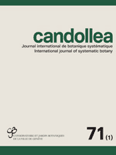
CANDOLLEA
Cultivating Insights in Ecology and Evolution.CANDOLLEA is a distinguished academic journal published by the Conservatoire et Jardin Botaniques Ville Genève, focusing on the fields of Ecology, Evolution, Behavior, Systematics, and Plant Science. With an ISSN of 0373-2967, this journal serves as a vital platform for researchers, professionals, and students aiming to deepen their understanding and contribute to the scientific discourse surrounding botanical research and ecosystem dynamics. Since its convergence in 2000, CANDOLLEA has trodden the path of scholarly excellence, currently residing in the Q3 quartile for both Ecology and Plant Science in 2023. Although it does not currently offer open access, the journal plays a critical role in disseminating valuable findings and innovative methodologies that shape contemporary ecological and botanical studies. The journal is located in Switzerland at CASE POSTALE 60, CH-1292 CHAMBESY, serving as a beacon for scholars dedicated to advancing their expertise in environmental and plant sciences.
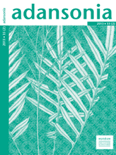
ADANSONIA
Connecting scholars for a greener tomorrow.ADANSONIA is a distinguished, peer-reviewed open access journal dedicated to advancing the field of plant science. Published by the Publications Scientifiques du Museum in Paris since 2000, this journal serves as a critical platform for sharing innovative research and discoveries in botany, ecology, and related disciplines. With its ISSN 1280-8571 and E-ISSN 1639-4798, ADANSONIA boasts a notable Scopus rank of #383 in the Agricultural and Biological Sciences category and a 2023 category quartile ranking of Q3 in Plant Science, indicating a meaningful contribution to the academic community. The journal's scope encompasses a broad range of topics, making it a vital resource for researchers, professionals, and students alike who are exploring the complexities of plant biology. Based in France, ADANSONIA not only enhances visibility for groundbreaking research but also facilitates open communication amongst scholars, ensuring that knowledge on plant science is accessible worldwide. Located at CP 39-57, Rue Cuvier, F-75231 Paris Cedex 05, France, this journal stands as a testament to the collaborative efforts in the pursuit of scientific excellence in plant sciences.
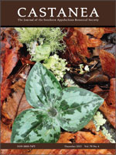
CASTANEA
Advancing Plant Science in the Southern AppalachiansCASTANEA is a distinguished journal published by the SOUTHERN APPALACHIAN BOTANICAL SOCIETY in affiliation with NEWBERRY COLLEGE. With an ISSN of 0008-7475 and an E-ISSN of 1938-4386, this esteemed publication serves as a vital platform for researchers and practitioners in the field of Plant Science. It has been circulating since 1982, and its scope focuses on the study of trees, their ecology, and conservation, thereby contributing significant insights into the biodiversity of the Southern Appalachian region and beyond. Despite its current ranking in the Q4 quartile and the 5th percentile in the Scopus Agricultural and Biological Sciences category, CASTANEA is committed to advancing knowledge and fostering a deeper understanding of plant sciences among academics and students alike. The journal does not currently offer Open Access options, maintaining a traditional subscription model that allows for carefully curated and peer-reviewed content. As you explore the advances in plant biology through CASTANEA, you will find an invaluable resource that supports both emerging and established scholars in their research endeavors.
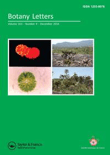
Botany Letters
Unlocking the Secrets of Plant Biodiversity and SustainabilityBotany Letters, published by Taylor & Francis Ltd, is a prominent journal in the field of Plant Science based in the United Kingdom. With its ISSN 2381-8107 and E-ISSN 2381-8115, the journal has established itself as an essential resource for researchers, professionals, and students alike, focusing on innovative studies and findings in botany. As a Q2 ranked journal in its category (2023) and holding a respectable Scopus rank of #200 out of 516 in Agricultural and Biological Sciences, it reflects a robust commitment to quality and relevance in the field. The journal's open access model ensures that groundbreaking research is readily accessible, fostering collaboration and knowledge sharing among the global scientific community. Covering a broad spectrum of topics within plant science from 2016, Botany Letters aims to catalyze advancements in the understanding and management of plant biodiversity and sustainability, ultimately contributing to conservation efforts and agricultural innovation.

Hacquetia
Unlocking Insights in Interdisciplinary Environmental ScienceHacquetia is an esteemed open-access journal dedicated to the interdisciplinary exploration of ecology, evolution, behavior, systematics, forestry, and plant science. Published by SCIENTO since 2007, this journal has established itself as a pivotal platform for researchers and academics looking to disseminate their findings in these critical fields. Nestled in the heart of Warsaw, Poland, Hacquetia offers unrestricted access to its content, promoting knowledge sharing among professionals, students, and enthusiasts alike. The journal, while ranked in the Q4 category across its relevant disciplines in 2023, serves as a valuable resource for those seeking to contribute to and engage with contemporary ecological and botanical research. Its commitment to open access ensures that cutting-edge research is available to a global audience, fostering innovation and collaboration in the scientific community.